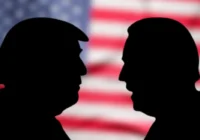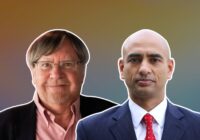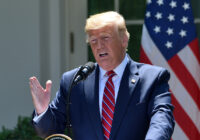Western-style democracies accept the dogma that governments are best or most justly run when each citizen has an equal say in deciding who should govern — the “one person, one vote” principle. For example, the US Supreme Court has declared that “the conception of political equality from the Declaration of Independence, to Lincoln’s Gettysburg Address, to the Fifteenth, Seventeenth, and Nineteenth Amendments can mean only one thing — one person, one vote.” This dogma is misguided.
At the outset, I want to make clear that the objective of this short piece is not to present a coherent upgrade of the current Western democratic system. Instead, it should be perceived as a wake-up call questioning the deep-rooted belief that the one-person, one-vote democratic system is the best we can hope for.
We should be able to ask this question critically. However, in Western-style democracies, it is considered problematic to publicly question the soundness of the electoral process and the one-person, one-vote principle. Westerners either ignore or scorn arguments that would expose this electoral system as fundamentally flawed. I experienced this disdain after I published the article “Chinese Capillary Democracy: What Can Western Democracies Learn from It?” in March 2016.
Rethinking our own systems does not mean imitating authoritarian regimes
In the article, I argued that Western democracies could be strengthened by modifying how their political leaders were elected and adopting a system that would result in more professional, meritocratic and stable governments. This new system could, in part, be modeled after the one that the Chinese have, although they have it mostly in theory alone. At no point did I suggest that the Chinese government itself is adequate for Western countries or that China has a real democracy.
Rather, I used the theoretical structure of Chinese local elections as an example. On the local level, one person, one vote could work, and promotions to higher levels could spring from local democracy. This is not how China actually works. Without a doubt, China is an authoritarian regime that is morphing into an autocracy under President Xi Jinping.
My article received numerous sarcastic comments, such as, “Mr. Meyer has sold his soul to the [Chinese Communist Party] on Alibaba,” “This is such a crap article. The [People’s Republic of China] is a mafia state,” and, “What a naive, narrow-minded, simplistic and ignorant piece of propaganda.” Numerous rigid beliefs and prejudices continue to hamper any attempt to establish a constructive conversation with Western-style democracy supporters.
Majoritarianism is wishful thinking
I agree that we should all be active members of society and participate in the nation’s decision-making process. However, no matter how extensive our individual knowledge and skills are, they will always be just a tiny fraction of what is needed to evaluate complex domestic and international issues. The assessment of the issues at stake — such as how to manage globalization or climate change, how to deal with China and Russia, or whether to bomb Iran or not — is far beyond the analytical reach of any single individual, including those with relevant expertise. This goes just as much for deciding who are the most capable leaders as it does for deciding which are the best policies.
When we are sick, we go see a doctor. When we want to build a bridge, we go to an engineer. When we want to invest, we go to an economist. When we want to find a cure for cancer, we go to scientists. All of them are experts. Also, it is interesting to note that no single successful private company is run as a democracy. Companies are run by teams of experts in the different areas affecting them. Yet managing a country is far more complex than any scientific endeavor or multinational corporation. Obviously, letting the general population decide how to do it does not make much sense.
Basically, a vote is the expression of a personal opinion and for it to be meaningful it must fulfill three preliminary conditions: gathering sufficient information about the issue under consideration, having the necessary background information and skills to analyze the gathered information, and spending sufficient time analyzing the information to, finally, draw sound conclusions. Only after these three requirements have been met can the individual form an opinion and, if he wishes, share it for the benefit of the community in the form of a vote. A common citizen is busy working to make a living and taking care of his family and his personal interests. This citizen cannot be expected to be able to have a working understanding of all the necessary geopolitical, economic, social, military, historical or legal dimensions to develop sound opinions on which to base his voting choices.
Hoping that a numerical majority of tremendously underinformed individuals in a country will make brilliant choices on extremely complex issues is simply an illusion. Or a delusion. Our incapacity is illustrated by the fact that even individuals with extensive relevant expertise are incapable of reaching a consensus on the best options in domestic and international matters. Individual experts frequently disagree and contradict each other and reach conclusions that are diametrically opposed. As soon as the issues go beyond what individuals can sufficiently grasp and relate to, the democratic voting system is ineffective and, therefore, popular voting to elect the leadership of a country is fundamentally unsound.
An editor at Fair Observer raised the objection that, while experts might very well know better than voters, they still should not make decisions for them, because experts can advise and inform elected leaders without overruling them. I do not believe that this holds water. At the end of the day, either experts or voters have to have the final say. If voters have the final say, nothing prevents their elected leaders from running into inadvisable wars, adopting irrational economic policies or ignoring the scientific consensus on climate change. We have all seen these things happen in living memory. As long as one person, one vote remains the rule, popular policies will overrule sound ones, experts be damned.
There is more than one way to do democracy
All this is not to say that people should not participate in a country’s political life. On the contrary, they should, but this should occur in a domain where an individual is capable of making educated, intuitive, critical decisions. For instance, individuals can sufficiently assess issues affecting their local communities and make educated choices in elections for their local representatives.
These representatives, elected by popular vote, would become part of the foundations of the national governing structure. This structure would predominantly consist of teams of professionals who aspire to long-term service in the government. Promotions within this governing would be based on a combination of performance (meritocracy) and internal elections. Ultimately, governing a country should be a long-term professional duty, not a temporal personal ambition.
Counting on the magic force of a numerical majority of fundamentally unqualified individuals to correctly elect the most adequate candidates to lead our nations through complex domestic and international matters is delusional. The West needs to take an honest and hard look at its obsolete democratic system and fundamentally redesign it to make it effective to overcome the challenges posed by the complex world we live in.
The views expressed in this article are the author’s own and do not necessarily reflect Fair Observer’s editorial policy.
Support Fair Observer
We rely on your support for our independence, diversity and quality.
For more than 10 years, Fair Observer has been free, fair and independent. No billionaire owns us, no advertisers control us. We are a reader-supported nonprofit. Unlike many other publications, we keep our content free for readers regardless of where they live or whether they can afford to pay. We have no paywalls and no ads.
In the post-truth era of fake news, echo chambers and filter bubbles, we publish a plurality of perspectives from around the world. Anyone can publish with us, but everyone goes through a rigorous editorial process. So, you get fact-checked, well-reasoned content instead of noise.
We publish 2,500+ voices from 90+ countries. We also conduct education and training programs
on subjects ranging from digital media and journalism to writing and critical thinking. This
doesn’t come cheap. Servers, editors, trainers and web developers cost
money.
Please consider supporting us on a regular basis as a recurring donor or a
sustaining member.
Will you support FO’s journalism?
We rely on your support for our independence, diversity and quality.











Comment